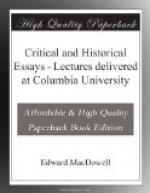Now the writers of these operas were great men who put their best into their work; the cause of the failure of these operas was not on account of the music, but the ideas and thoughts with which this music was saddled. What were the books which people read and loved in those days (1750-1800), that is, books upon which operas might be built? In England we find “The Castle of Otranto,” “The Mysterious Mother,” etc., by Horace Walpole. Now Macaulay says that Horace Walpole’s works rank as high among the delicacies of intellectual epicures as the Strasburg pie among the dishes described in the Almanach des Gourmands. None but an unhealthy and disorganized mind could have produced such literary luxuries as the works of Walpole.
France had not yet recovered from the empty formalism of the preceding century, Bernardin de St. Pierre was a kind of colonial Mlle. Scudery, and Jean Jacques Rousseau, one of the sparks which were to ignite the French Revolution, writes his popular opera to the silly story of “The Village Soothsayer.” Had not Gluck written to the classics he would have had to write “a la Watteau.”
In Germany, conditions were better; for the so-called Romantic school had just begun to make headway. In opera, however, this school of Romanticism only commenced to make itself felt later, when we have a crop of operas on Fouque’s “Undine” as well as “Hofmann’s Tales.”
It is as though opera had to dress according to the prevailing fashion of the day. The very large sleeves of one year look strange to us a little later. Just so is it with opera; for those old operas by Mehul, Spontini, Salieri, and others all wear enormous crinolines, while the contemporary instrumental works of the same period, unfettered by fashion, still possess all the freedom which their limited speech permitted them to have. Thus we see that opera is necessarily a child of the times in which it is written, in contrast to other music which echoes but the thought of the composer, thought that is not necessarily bound down to any time, place, or peculiarity of diction.
In Germany, Italian opera was never accepted by the people as it was in France. In the latter country, opera had to be in the vernacular and practically to become French. Lully’s operas were written to libretti by Quinault and Corneille; and while, as early as 1645, Paris imported its opera from Italy, this art form was rapidly modified to suit the public for which it was secured. Even with Piccini and Gluck, and down to Rossini and Meyerbeer, this nationalism was infused into the foreign product. In Germany the case was entirely different, for up to the very last, Italian opera was a thing apart. Although German composers, such as Mozart and Paer, wrote Italian opera, the “Singspiel” (a kind of opera comique), found its culminating point in Weber’s “Freischuetz,” which fought against Rossini’s operas for supremacy in Germany.




